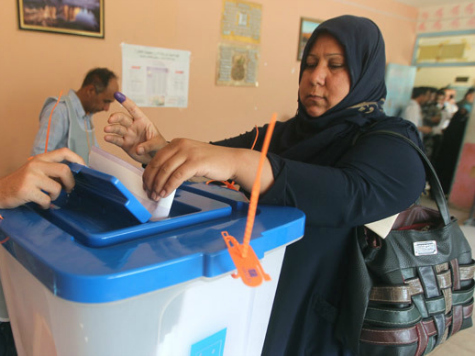
Fourteen people have died, and Islamist militants threaten to attack as many others as they can, but the national elections go on nonetheless in Iraq today, as voters return to the polls for the first time since the United States withdrew its military forces in 2011.
The capital, Baghdad, remains in a state of semi-lockdown as officials prevent vehicles from approaching voting stations, fearing a car bomb attack. In other parts of the country, elections continue with caution. Only 70% of the state of Anbar could successfully hold elections, the BBC reported, as the city of Falluja remained impenetrable to government officials, under control of Islamist militants. Roadside bombs have taken the lives of election workers and others who have participated in elections in less secure regions. Before the elections began, Islamist terrorists bombed an election rally and targeted early voting stations.
Even in parts of the country that suffer only occasional attacks from militants, particularly the al-Qaeda offshoot group ISIS (Islamic State of Iraq and the Levant), residents are acting with caution to avoid becoming victims of anti-election violence. The Associated Press reports that shops closed early and the streets are emptier than usual at earlier hours. Residents interviewed appeared listless when discussing the elections, with little hope that their situation will improve. One voter in Baghdad told the AP, “It is only now that it is election season that we hear from politicians… the only change we might see in Iraq after the election is that we will move from bad to worse.”
Iraqi politicians, meanwhile, have expressed their belief that citizens’ confidence that they may vote safely and high turnout are key to the future of a democratic Iraq. Iraqi Deputy Prime Minister Saleh al-Mutlaq told Xinhua today that “the future of Iraq will depend on this election” and that setting a democratic precedent would ensure a bright future for the country.
Polls will close at 6:00 P.M. local time Wednesday. Prime Minister Nouri al-Maliki is running for reelection and expected to win, though much more narrowly than during his first run. Al-Maliki has the support of the nation’s Shiite minority and the support of neighboring Shiite Iran, which has led some to speculate that his reelection could exacerbate tensions between Shiite and Sunni Iraqis in a country that has witnessed increasing discord between the two groups. During his tenure, al-Maliki has also lost the support of the nation’s Kurdish minority, with the groups clashing over the oil trade.

COMMENTS
Please let us know if you're having issues with commenting.